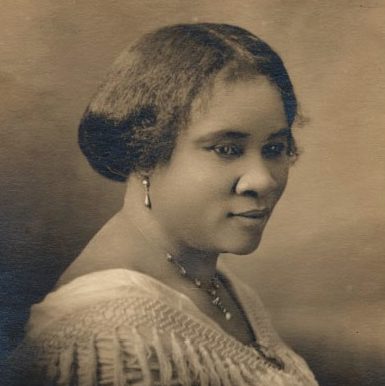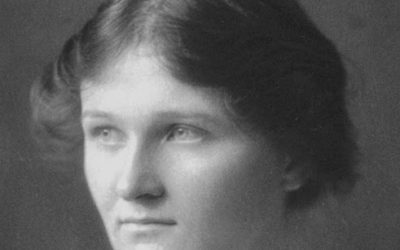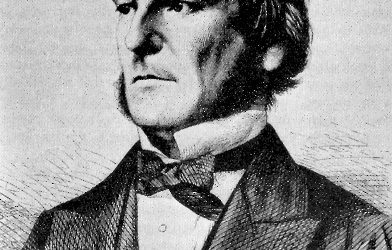Back in the early 20th century, long before the “black is beautiful” movement of the 1960s, cosmetics marketers knew that the beauty of black women was unique, as were their beauty needs. Some of the first fortunes made by African-American businesspeople were made in the cosmetics industry, by selling specialized products to a new customer base: the black middle class. The most famous product to emerge from this market is probably the Nile Queen series of cosmetics produced by the Kashmir Chemical Company of Chicago. But the most notable personality to emerge from it, without doubt, is Madam C.J. Walker.
Madam Walker’s image, like her cosmetics, was the product of her own marketing genius. She was born Sarah Breedlove on a plantation near Delta, Louisiana shortly after the Civil War. The youngest child in her family, Sarah was also the first to be born into freedom, yet her childhood was not an easy one. By the age of seven she was an orphan, and at ten she was already working as a domestic servant. She lived for some time with an older sister and brother-in-law, but her first steps toward independence were taken when she moved with her young daughter to Saint Louis, Missouri in 1888.
Three of Sarah’s brothers lived in Saint Louis and worked as barbers; Sarah worked as a laundress, earning about a dollar per day. After more than a decade of learning the basics of hair care from her brothers, she was hired as a sales agent for Annie Turnbo Malone, an African-American hair product entrepreneur who inspired Sarah to imitate and eventually surpass her. Finally, in 1906, she began to make and sell her own hair-care products and created the persona of Madam C.J. Walker to market them.
The “Walker” came from her new husband, Charles Walker, who also served as her business partner. The “Madam” was meant to evoke the French women whose names were eminent in the world of cosmetics. And the products themselves were based on her own difficult experiences. Like many poor women of her time, Walker had suffered from a number of skin problems, including severe dandruff and hair loss. One of her most successful products was a “Wonderful Hair Grower” that promised to replace hair that had fallen out from stress, malnourishment, or the abrasive soaps that many people used. With her thorough knowledge of black women’s beauty needs, Walker made her company into a household name and earned a fortune for herself.
Walker was also renowned as a philanthropist and socialite. She donated a great deal of money to black causes and lectured across the country on social issues. Her estate in New York, the Villa Lewaro, was designed by the first licensed black architect in the state and became a meeting place for Harlem Renaissance intellectuals. Her daughter, A’Lelia Walker, in turn became manager of the Walker Company and made her own name as a patron of the arts, particularly of black musicians.
Madam C.J. Walker is emblematic of the new wealth generated by the black community in early 20th-century America. Born into poverty and living most of her adult life in poverty, she drew on the knowledge that was available to her to create a hugely successful company, selling products inspired by her own struggle to preserve beauty in the harshest conditions. She knew her market and offered products that lower- and middle-class African-American women trusted. The fortune she made from this enterprise was used to foster African-American high culture and provide support for the poor. Both literally and metaphorically, her life demonstrates the truth of a contemporary advertisement for Nile Queen cosmetics:
“There is just as much real beauty in the colored race as in any people of the world if it is properly developed.”
Next Post: Pedro Flores, Filipino-American businessman and inventor of the “Duncan” yo-yo














